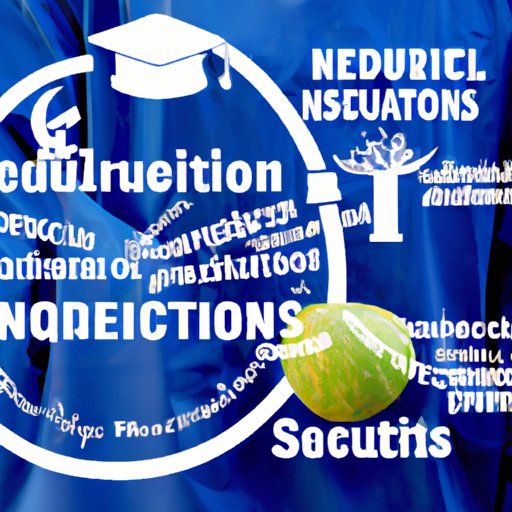Introduction
A nutrition science degree is an academic qualification that provides graduates with the skills and knowledge to understand the complex relationship between diet and health. It equips students with the tools to advise individuals and organizations on how to make informed decisions about food choice and dietary intake in order to improve health and well-being.
The field of nutrition science is diverse and rapidly changing, and there are a range of potential job opportunities for nutrition science degree holders. In this article, we explore some of these possibilities, as well as the impact of nutrition science on public health, and the personal benefits of having a nutrition science degree.
Exploring Job Opportunities for Nutrition Science Degree Holders
Nutrition science degree holders have a variety of job opportunities available to them. The most obvious option is to pursue a career in the healthcare industry, where nutritionists are employed in hospitals, clinics and other medical settings. These roles involve providing advice on diet and nutrition to patients, developing meal plans and helping to monitor the progress of those receiving treatment.
In addition to these traditional roles, nutrition science degree holders may also find employment in a range of other industries. For example, they may work as consultants for food manufacturers or retailers, advising on product development and nutrition labeling. They may also work in education, providing guidance and advice on healthy eating habits to schools or colleges. Finally, nutritionists may find employment in the media, contributing to publications and websites on diet and health.

The Impact of Nutrition Science on Public Health
Nutrition science has a significant impact on public health. By understanding the role of food in preventing and managing disease, nutritionists are able to educate individuals and communities on how to make healthier choices. This knowledge can be used to influence government policies, such as the introduction of mandatory food labeling or taxation on unhealthy products.
Nutrition science also plays an important role in the prevention of disease. By promoting healthy diets, nutritionists can help to reduce the risk of chronic conditions such as obesity, diabetes and heart disease. Through their work, nutritionists can help to raise awareness of the importance of making healthy food choices, and provide advice on how to do so.
Exploring the Benefits of a Nutrition Science Degree for Personal Well-Being
Having a nutrition science degree can also be beneficial for individuals, as it provides them with the knowledge and skills to make informed decisions about their own health and diet. Understanding the role of nutrition in optimal health helps individuals to develop healthy eating habits and identify potential areas for improvement.
In addition, those with a nutrition science degree can use their skills and knowledge to improve their own diet and health. They can evaluate the nutritional content of foods, and plan meals that are balanced and nutritious. They can also provide advice and support to family and friends who want to make healthier lifestyle choices.
Conclusion
A nutrition science degree can open up a range of job opportunities, both in the healthcare industry and beyond. Those with a nutrition science degree can also play an important role in public health, by promoting healthy eating habits and influencing government policy. Finally, a nutrition science degree can be beneficial for personal well-being, as it provides individuals with the knowledge and skills to make informed decisions about their own diet and health.
(Note: Is this article not meeting your expectations? Do you have knowledge or insights to share? Unlock new opportunities and expand your reach by joining our authors team. Click Registration to join us and share your expertise with our readers.)
